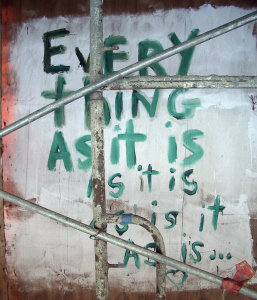Dissolving the Endless Distance
 Most of you know by now that I write the occasional piece of poetry even though I’d classify myself as a novelist if anyone asked. But one of the main things I enjoy about poetry – reading and writing it – is that it asks us to think, and think deeply about not only what the poem means, but how it uses language to shape and deepen that meaning.
Most of you know by now that I write the occasional piece of poetry even though I’d classify myself as a novelist if anyone asked. But one of the main things I enjoy about poetry – reading and writing it – is that it asks us to think, and think deeply about not only what the poem means, but how it uses language to shape and deepen that meaning.
Studying poetry at university was probably the most helpful class I ever took when it comes to my writing.
Oh sure, you say. Kate, you write horror/paranormal/supernatural stories. Where does poetry fit into that?
It’s about language. Poems are all about language and in an extremely compressed form. They say so many things using so few words. They give you insight, not only into what it means to be human, but into what language and communication is about and the ways in which it can be displayed, manipulated, enjoyed, all in an effort to provide the reader with some deeper meaning.
I was reading through some of my favourite poems and came across this one, an excellent illustration of what I’m trying to say.
Meditation at Lagunitas
BY ROBERT HASS
All the new thinking is about loss.
In this it resembles all the old thinking.
The idea, for example, that each particular erases
the luminous clarity of a general idea. That the clown-
faced woodpecker probing the dead sculpted trunk
of that black birch is, by his presence,
some tragic falling off from a first world
of undivided light. Or the other notion that,
because there is in this world no one thing
to which the bramble of blackberry corresponds,
a word is elegy to what it signifies.
We talked about it late last night and in the voice
of my friend, there was a thin wire of grief, a tone
almost querulous. After a while I understood that,
talking this way, everything dissolves: justice,
pine, hair, woman, you and I. There was a woman
I made love to and I remembered how, holding
her small shoulders in my hands sometimes,
I felt a violent wonder at her presence
like a thirst for salt, for my childhood river
with its island willows, silly music from the pleasure boat,
muddy places where we caught the little orange-silver fish
called pumpkinseed. It hardly had to do with her.
Longing, we say, because desire is full
of endless distances. I must have been the same to her.
But I remember so much, the way her hands dismantled bread,
the thing her father said that hurt her, what
she dreamed. There are moments when the body is as numinous
as words, days that are the good flesh continuing.
Such tenderness, those afternoons and evenings,
saying blackberry, blackberry, blackberry.
This poem fascinates me, especially as the poem is a meditation, a form of ode.
I have every admiration for the ode; to be able to capture something in its moment, to be able to see something then and there the way it is, has its own satisfaction. How quickly though that moment is lost. It seems to me little wonder that so many odes focus on nature, which suffers its loss but regenerates, or takes for subject matter objects which stand unmoved against time – mostly unmoved.
I’ve found in my own writing, when attempting the ode, that loss creeps in even so; the associations that come to me more often than not are ones of time, change, and lost opportunities. Experience – the way we see, feel and translate the world around us becomes, as in Hass’s poem, a series of associations. Nothing is what it is on its own and nothing can be captured in its entirety, pinned down, labeled.
To me, it is as though we see something and yearn to capture its essence in our writing but are afraid even while we try that it will never be so; even the most beautiful and concise language is never enough, and something is always lost and in most ways this is so whether it is poetry, short stories or even perhaps novels that we write.
“…From this ode the world from words that burst
open, and this awful sadness spilling
even so from the rapture that contains everything.
To Mount Victoria – Ian Wedde
Filed under: Writerly Workbox











